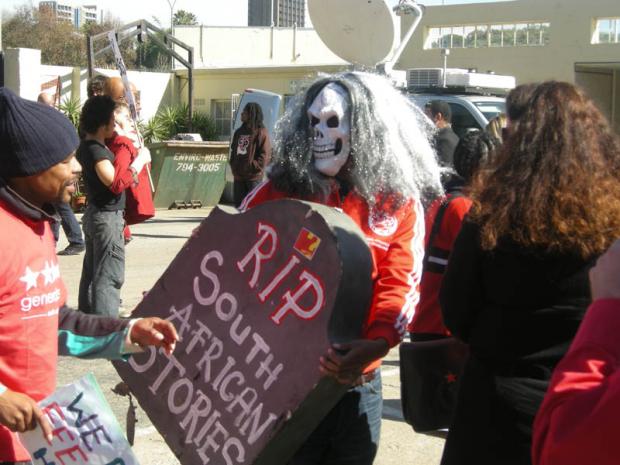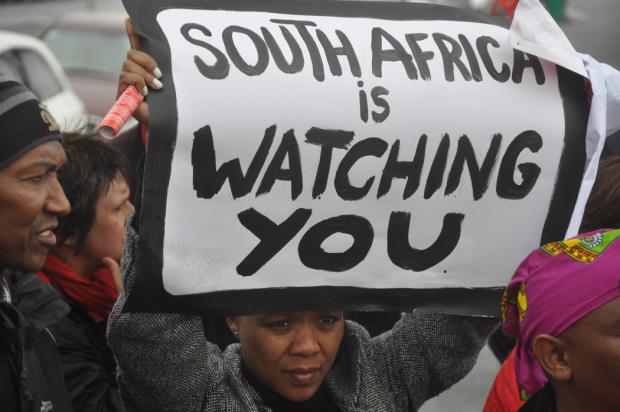Open letter to SABC Chair on the National Key Points Act
April 13, 2014
SOS Coalition Backs COSATU’s Call to Rescue the SABC from its Sorry State
June 24, 2014Ministerial Instability and ICT Fragmentation Offer South Africa No Good Story to Tell

TVIEC march to the SABC - 4 June 2009 (Picture: Marc Schwinges)
Ministerial Instability and ICT Fragmentation Offer South Africa No Good Story to Tell
SOS Coalition notes with concern the President’s creation of a new Ministry of Telecommunications and Postal Services and a redefined Communications Ministry in the announcement of his new Cabinet.
Communications and ICTs that put people first
The Coalition has, from the very beginning, advocated for a broadcasting and ICT sector that is people-centered and promotes not only a plurality, but diversity of voices. It is our belief that information access and freedom of expression, which public broadcasting services are central to, are the lifeblood of any true democracy. Moreover, as we increasingly grow into an information society, South Africa desperately needs a broadcasting and ICT sector that is stable, encourages innovation and puts the needs of people before profit and State control.
Five ministers in five years: what hope for stability in the Communications Ministry?
Regrettably, instead of ensuring stability in a Ministry that has been beset by scandal and the turbulence caused by five Ministers in five years, President Zuma has not only chosen to release the hard-working former Minister, Yunus Carrim, from his service, but also redefined the role and mandate of the Communications Ministry.
It is the Coalition’s view that in his short term of service, Carrim was a singularly stabilizing force in the Ministry, demonstrating effective and visionary leadership, particularly in his efforts to speed up the long-overdue digital migration process that has been retarded by long-standing conflict between broadcasters and electronics manufacturers. It strikes us as absurd that he would not be permitted to see his bold plan of action to release the blockages in the migration process and give people better access to better broadcasting services. Indeed, this is another case of moving five steps back to move one step forward for broadcasting.
What is even more concerning is the reorientation of the Ministry’s mandate from developing and overseeing the implementation of policy that enables a vibrant communications sector to one that drives the agenda of a “good story to tell.” The absorption of what should be wholly independent institutions such as the SABC, the MDDA and ICASA into this Ministry must concern all South Africans.
• Does the strategic reorientation of the Communications Ministry mean that the captured SABC will be forced to buckle under the call for 70% “good” news?
• Should the vulnerable and contested community broadcasting sector brace itself for assumption into the State machinery instead of being beholden to the communities they serve?
• Is there any hope for ICASA to be given the institutional independence, power and teeth it so sorely needs and is required by the Constitution and legislation to truly be a regulator for the people?
All of these institutions and, particularly the SABC, have been under assault by both political and commercial forces for years, and with no intervention from government when it mattered most. Indeed, the reorientation of Communications Ministry not only has the practical implication of undermining the constitutional and statutory imperative to have an independent and people-centered public and community broadcasting sector, but also subverts the ANC’s own policy resolutions which have been consistently adopted in successive policy conferences and promised by high-ranking office bearers including the incumbent Deputy President, Cyril Ramaphosa, as far back as in 1992.
The President’s announcement, in this regard, only indicates to us that the project is to denude our public broadcasters and regulator bare of any independence and power they might have, and retain them as organs of the State.
What happened to that progressive and integrous statement by the ANC in its demand for an Independent Broadcasting Authority that:
“we […] insist that the public be informed of all views fully and fairly through a public broadcaster’s loyalty to serving a total audience with integrity”?
What happened to the commitment to “establish[ing] both the principle and practice of that independence now”?
This transformation of the Communications Ministry into one of propaganda is certainly not a good story to tell and SOS will continue to advocate for the transformation of the SABC and ICASA into Chapter 9 institutions in order to free them from the grip of state and commercial control.
Fragmentation in the age of convergence?
It is alarming that, in an age of technological convergence, telecommunications and postal services would be fragmented from communications services as a whole.
This fragmentation can only be read as irrational particularly in light of the necessary international move to bring ICTs, which include broadcasting services, in line with and under converged legislation, policy and regulation. Indeed, even locally, it fundamentally undermines the ICT Policy Review process and treats its recommendations with contempt.
• What happens to the ongoing ICT Policy Review and under which Ministry and to what end will it be coordinated?
• What happens to the stuck broadcasting digital migration project into which hundreds of million have been poured over the last seven years, with the people of South Africa yet to reap any benefit out of it?
Further, it only spells out an impending disaster of confusion and conflict between the Ministries.
• How does the President expect these ministries to develop policies in respect of anything that remotely bridges or unifies broadcasting with telecommunications, broadband and the interne?
• With ICASA falling under the aegis of one Minister (Communications), how will it perform its regulatory functions falling under another (Telecommunications and Postal Services)?
What these developments only demonstrate is that government’s project for State industrialization has entirely overtaken the critical need our society has for democratized information and communication technologies and services. It is our view that South Africa’s desperate need to eradicate the triple burden of unemployment, poverty and inequality cannot foreground our desperate need to democratize communications services and promote information access.
Poverty and inequality are not only material conditions, but structural ones, which necessarily require an integrated approach to be resolved. In so deeply unequal a society as ours, it is flawed logic to assume that by simply alleviating the material impoverishment and unemployment of our people through State capitalization of telecommunications, inequality will be eradicated. In an information society, for our people to be released from the stronghold of structural inequality, our people cannot solely be seen as a ready labour force for exploitation by the capitalist machinery. They must also be enabled to access and actively participate in an information society, which necessarily requires the integration of telecommunications and postal services within a broad and open communications agenda premised on people-centered information access for all.
We call on the President and the incumbent Ministers of Communications and Telecommunications and Postal Services, respectively, to:
1. Further clarify the role of the two new Ministries and their relationship with one another;
2. Explain the rationale behind the decision to fragment these Ministries and what practical bearing this will have on the move towards technological convergence;
3. Explain how ICASA is expected to discharge its regulatory function across the full gamut of ICTs which have been split right down the middle across two ministries;
4. Commit to seeing through the ongoing ICT Policy Review and to explain what impact the fragmentation of the Ministries will have on the continuation and coordination of the process;
5. Commit to the substantive inclusion of public and civil society voices in the ongoing negotiation for a truly democratic broadcasting and telecommunications sector that goes beyond merely procedural public consultation processes.
The SOS Coalition represents a broad spectrum of civil society stakeholders committed to the broadcasting of quality, diverse, citizen-orientated public-interest programming aligned to the goals of the SA Constitution. The Coalition includes a number of trade union federations including COSATU and FEDUSA, a number of independent unions including BEMAWU and MWASA; independent film and TV production sector organisations including the South African Screen Federation (SASFED); a host of NGOs and CBOs including the Freedom of Expression Institute (FXI), Media Monitoring Africa (MMA), SECTION27 and a number of academics and freedom of expression activists.
For more information contact:
Sekoetlane Jacob Phamodi
Coordinator
076 084 8077

